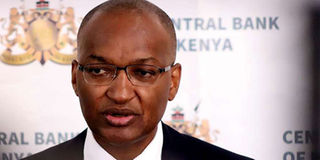CBK frees Sh35bn to support distressed borrowers, cuts interest

Central Bank of Kenya Governor Patrick Njoroge. PHOTO | FILE | NATION MEDIA GROUP
What you need to know:
- The banking sector regulator also cut interest rates by one percentage point, further easing the burden of loan repayments.
- Dr Njoroge said the MPC’s deliberations focused on minimising the economic and financial impacts.
- Giving loans, bailouts and loan repayment holidays are some of the measures that have been advanced by various banks to help businesses remain afloat.
The Central Bank of Kenya (CBK) Monday freed up Sh35.2 billion and made it immediately available to commercial banks to support distressed borrowers as a result of the novel coronavirus (Covid -19).
The banking sector regulator also cut interest rates by one percentage point, further easing the burden of loan repayments as the industry finds ways to shield its books from defaults expected as the country implements far-reaching measures to contain the outbreak.
After a meeting yesterday by the Monetary Policy Committee (MPC), which sets the interest rates and gives policy directions to deal with inflation, CBK Governor Patrick Njoroge said although the pandemic’s impact on the county’s economy is still evolving, it is evident that it could be severe.
Dr Njoroge said the MPC’s deliberations focused on minimising the economic and financial impacts.
CENTRAL BANK RATE
To this end, the committee lowered the Central Bank Rate (CBR) to 7.25 per cent from 8.25 per cent. This effectively reduces interest rates by a similar margin. It means that if your bank was charging you an interest rate of 14 per cent on your current loan, it will reduce it to 13 per cent.
The CBR is the base rate used to price loans and banks load on it additional charges to compensate for risk and factor in the profit margin. Any increase or reduction on this rate has an automatic impact on the cost of loans.
The MPC also resolved to reduce the Cash Reserve Ratio (CRR) to 4.25 per cent from 5.25 per cent. Dr Njoroge, who also chairs the MPC, said this reduction would release Sh35.2 billion additional liquidity accessible to banks to directly support borrowers distressed as a result of Covid-19. Banks are preparing for tough times ahead despite these measures aimed at dealing with inevitable defaults on loans as borrowers fail to service their loans due to cash flow problems.
Giving loans, bailouts and loan repayment holidays are some of the measures that have been advanced by various banks to help businesses remain afloat.
“Additionally, CBK will ensure that the interbank market and liquidity management across the sector continue to function smoothly,” the CBK said in a statement.
The CBK expects overall inflation to remain within the target range in the near term, reflecting lower food prices with the favourable weather conditions, a decline in international oil prices and muted demand pressures.
ECONOMIC GROWTH
But because of the pandemic, the CBK projects that economic growth will decline significantly in 2020, from a baseline estimate of 6.2 per cent to possibly 3.4 per cent, arising from reduced demand by Kenya’s main trading partners, disruptions of supply chains and domestic production.
“The fundamental concerns and anxieties centre on the health impact, job losses, and the duration of the crisis. The ongoing interventions by the government are aimed at containing the pandemic and moderating the economic and social impact,” Dr Njoroge noted. The weakening Kenyan currency will only make things worse.
CBK notes that the foreign exchange market has recently experienced some volatility. largely due to uncertainties with regard to the impact of Covid-19 and a significant strengthening of the US dollar in the global markets.
“The current account deficit is projected at 4 to 4.6 per cent of the gross domestic product (GDP) in 2020, but the outcome will depend on the duration and intensity of the pandemic, and its impact on exports particularly horticulture, transport and tourism services, and imports,” the banks notes.
A lower petroleum products import bill is also expected to moderate the impact of the virus on the current account.
This comes days after the CBK released a Sh7.3 billion cheque to the National Treasury, money it gained after those with the old Sh1,000 notes failed to replace them during last year’s crackdown on cash earned through questionable means.





